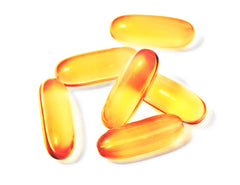What to look for when buying pet supplement fish oils?

What to look for when buying pet supplement fish oils?
1 Low contamination
A major concern that is not very widely recognized is that many low-cost feed or pet grade fish oils on the market are contaminated with relatively large amounts of heavy metals and toxic chemicals. Toxins like mercury are typically screened for at least in higher quality pet brands, however, there are other contaminants that are unlikely to be tested for or removed.
Some of the most common contaminants found in fish and thus fish oils include:
- PCBs
- Dioxin
- PDEs
- PCP's
- Toxic metals such as mercury, cadmium, lead, chromium and arsenic
Smaller fish lower on the food chain, such as herring, sardines, menhaden and anchovies are better than larger predator fish since they have not become large and old and as such have not had time to bioaccumulate heavy metals and other toxins in their tissues and body fat.
A salmon is going to have less toxins and heavy metals in it than a huge grandfather tuna. A large tuna has a lot more mercury and other heavy metals in them because they're older fish and they accumulate these things in their body.
BUY SPECIALLY FORMULATED PET FISH OILS MADE FROM ONLY HUMAN GRADE FISH OILS
Reputable pet health supplement companies will use only cleaned HUMAN GRADE FISH OILS which have been thoroughly tested for ALL CONTAMINANTS and refined to remove the toxins and heavy metals to extremely low levels. Only about 2 -3% of the fish oil produced is destined for human grade supplements, the vast majority is used for fish food and livestock uses.
2 Omega-3 Fats are Incredibly Fragile
Omega-3 fats whether animal sourced or plant source are fragile and are VERY easily damaged by high heat, oxygen and light.
Because long-chain omega-3s EPA and DHA are extremely fragile and easily become rancid and oxidized they are typically lacking in commercial dog foods that we tend to feed our dogs.
While pet food labels may state that Omega-3 essential fatty acids have been added, the reality is that the food will be very low in Omega-3 and often devoid of the marine-based DHA and EPA Omega-3s due to the technical difficulties of pet food manufacturing and the unavoidable exposure to high heat, air and light.
Rancid fish oil smells bad and also tastes awful. It is important to understand that rancid fish oil is not at all beneficial and can be harmful.
Consuming rancid fish oil causes a reaction in the body known as oxidative stress in the cell membrane. Fats are an integral part of cell membranes and essential to inter/intracellular signaling throughout the body. These fatty acid chains in the cell membrane are easily oxidized by “free radical” damage. This free radical damage takes place when a high energy particle, known as an electron, “bounces around” looking for a place to land and give up its energy. Free radical damage cells is problematic because the energy from that loose free radical electron can be passed from one fat chain to another in a true “chain reaction” as that electron’s excess energy bounces from one fat chain to another doing damage all the way.
When a dog consumes rancid fish oils, their body must use its stores of antioxidants such as vitamin E to neutralize the rancid oils, leaving fewer of these critically important anti-oxidant resources available to their body for free radical protection, cellular repair and disease prevention.
Feeding a very high-quality FRESH FISH OIL Omega-3 supplement is therefore highly advised in order to make certain that your dog receives the many known health benefits of marine based long-chain omega-3s EPA and DHA.
Evaluate your current fish oil product packaging. The best way to tell whether or not your omega-3 fish oil supplement is fresh is the smell test. If you have a jug of fish oil or a pump bottle with a type of shampoo pump – both of which permits air into the container very likely the fish oil is rancid after about a week after opening the package. If the oil looks dark and your nose gets a whiff of something that reminds you of dead rotten fish then your fish oil is rancid.
Bigger is NOT better. If buying a liquid form of fish oil only purchase small containers. The more times that a container is opened and closed the more air and oxygen will get mixed in and over time the fish oil becomes rancid over time. KEEP ANY CONTAINER THAT AIR ENTERS INTO IN THE REFRIGERATOR AFTER OPENING. The cold slows down oxidation and rancidity.
Shampoo pumps are NOT designed for fish oil: Shampoo type bottle pumps push air and thus oxygen into the fish oil and thus making it oxidized and rancid. There are very special medical AIRLESS PUMPS that WellyTails fish oils are packaged in in order to keep air and oxygen OUT of the bottle container and thus the oil. These special WellyTails “airless dosing pumps” make it easy to always be providing a healthy fresh fish oil.


Leave a comment